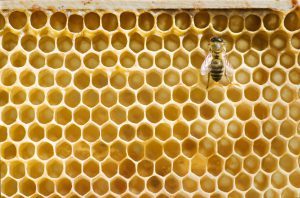 Who’s old enough to remember Burl Ives singing “the buzzing of the bees in the peppermint trees” on the Big Rock Candy Mountain? Or maybe your mother sang it to you when you were a child?
Who’s old enough to remember Burl Ives singing “the buzzing of the bees in the peppermint trees” on the Big Rock Candy Mountain? Or maybe your mother sang it to you when you were a child?
Though Big Rock Candy Mountains and peppermint trees might be a bit thin on the ground these days, a happy growth in the population of those buzzing bees seems to be stimulated by many of the policies adopted by camping and caravanning parks and resorts, according to an article in the Caravan Times, published on the 11th of August 2016.
Why honeybees love caravanning
Here at Cover4Caravans, of course, we’re delighted to be associated with any kind of pursuit that encourages a growth in the population of these industrious and life-giving insects. But how are caravanning and camping sites and parks helping to boost this summer’s healthy growth?
The answer lies, of course, in the way in which the grounds of these sites and parks are being made bee-friendly. Honeybees love flowering plants, of course and some species are especially attractive because of the nectar and pollen they produce mainly in the spring and autumn. This is the reason that bees are particularly fond of honeysuckle, foxgloves and heather, for example.
“Glamping pods” – made by drilling holes and tunnels into fallen logs and tree branches – may even be made for some species of bee.
For honeybees, site owners and caravanners
Everyone seems to be a winner in the provision of sanctuaries for honeybees. Chief of the beneficiaries are the bees themselves, of course.
But following closely behind are those site owners now able to sell jars of locally-produced honey to grateful campers. In recognition of the all-round benefits of growing the honeybee population, some caravan sites and parks are even making gifts of wildflower seeds so that campers can take them home, sow them and encourage new swarms in their own back gardens.
Who knows, you might soon be able to offer jars of honey produced in your own back garden to friends, relations and passers-by.
Find out more
The success of these kinds of developments lies in a partnership between camping and caravanning sites and parks and support given to the British Beekeepers’ Association. The latter has teamed up with the David Bellamy Conservation Award Scheme, whose Rufus Bellamy – son of the famous botanist – is heading a nationwide initiative to save and expand the native population of honeybees.
Already more than 550 camping and caravanning sites and parks are understood to have signed up to the scheme and are busy planting nectar-rich blooming flowers, reducing the use of harmful pesticides and chemicals, and in some instances even setting up their own beehives.
As is so often the case, of course, capturing the public imagination and grass-roots action is largely a question of information and education. This is a way in which caravan sites are also showing the way by offering campers as much information as possible not only about the initiatives taken on the site where they are staying, but also helpful advice about continuing the initiative once they get home, in their own gardens and patio plantings.
If you are interested in becoming part of the nationwide movement to protect and develop our population of honeybees, you might want to contact either the British Beekeepers’ Association or the David Bellamy Conservation Award Scheme directly or through a participating caravan site.

